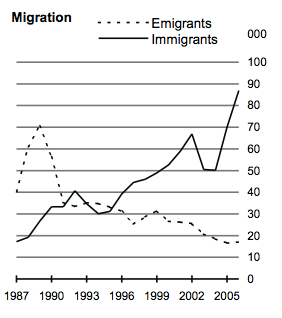 Like “Henry”:https://crookedtimber.org/2007/07/28/thousands-are-sailing/, I’m part of the last generation of Irish people to date for whom fleeing the country was a standard career path. I emigrated in 1995, coincidentally the year that the boom in immigration really began, and the era of significant net migration arrived. My usual impeccable timing, in other words. The scale of Irish emigration throughout the twentieth century is astonishing. From 1926 to 1961, the rate of emigration was sufficient to at least equal and usually significantly outweigh the natural rate of increase in the population, so that overall population numbers either stagnated or fell. Thus, despite the fact that the country’s “Total Fertility Rate”:http://en.wikipedia.org/wiki/Total_fertility_rate was over _three_ until the early 1980s, there were fewer than 150,000 more people living in Ireland in 1979 than there had been in 1901. The government conducted 14 censuses between 1926 and 2006. Of these, only four have shown positive net migration from the previous census, and three of those periods are since 1990: 1971-79 (+14 thousand), 1991-96 (+2k), 1996-2002 (+26k) and 2002-2006 (+42k).
Like “Henry”:https://crookedtimber.org/2007/07/28/thousands-are-sailing/, I’m part of the last generation of Irish people to date for whom fleeing the country was a standard career path. I emigrated in 1995, coincidentally the year that the boom in immigration really began, and the era of significant net migration arrived. My usual impeccable timing, in other words. The scale of Irish emigration throughout the twentieth century is astonishing. From 1926 to 1961, the rate of emigration was sufficient to at least equal and usually significantly outweigh the natural rate of increase in the population, so that overall population numbers either stagnated or fell. Thus, despite the fact that the country’s “Total Fertility Rate”:http://en.wikipedia.org/wiki/Total_fertility_rate was over _three_ until the early 1980s, there were fewer than 150,000 more people living in Ireland in 1979 than there had been in 1901. The government conducted 14 censuses between 1926 and 2006. Of these, only four have shown positive net migration from the previous census, and three of those periods are since 1990: 1971-79 (+14 thousand), 1991-96 (+2k), 1996-2002 (+26k) and 2002-2006 (+42k).
Posts by author:
Kieran Healy
Quite dull for the most part, I thought. Should have been c. 300 pages long. Backstory inserted by way of newspaper articles and book excerpts or what have you is tedious. But you knew all that from Books 4, 5 and 6. Did I mention there are *spoilers* below the fold?
 Simpsonize yourself by uploading a headshot, providing a few variables, and (allegedly) having it automatically converted. You can tweak the image afterwards. JamesJoyner thinks it’s lame. Here I am — I’ll leave the veridicality of the representation for others to judge. The site is a bit finicky, perhaps because it’s overloaded with users. If you get it to work, post a link to yourself in the comments.
Simpsonize yourself by uploading a headshot, providing a few variables, and (allegedly) having it automatically converted. You can tweak the image afterwards. JamesJoyner thinks it’s lame. Here I am — I’ll leave the veridicality of the representation for others to judge. The site is a bit finicky, perhaps because it’s overloaded with users. If you get it to work, post a link to yourself in the comments.
To echo “Sandy Levinson”:http://mediamatters.org/rd?http://www.tnr.com/blog/openuniversity?pid=123915 and “Eric Rauchway”:http://mediamatters.org/altercation/200707130003, “Is it a constitutional crisis yet?”
Here is a likely poorly-specified question for biologists, prompted by wanting to buy Alan Weisman’s The World Without Us and then reading a story about genetically modified mice. Weisman’s book asks how the world would change and what of us would survive if humans were all wiped out overnight or just disappeared by something (a virus, the Rapture). The premise is unlikely (something that kills people — all people — but leaves the rest of the world standing) but intriguing.
So I wondered, what if, long, long after our disappearance, some other species arose on earth at least as intelligent as us and eventually started doing evolutionary and molecular biology. Let’s say they have a working theory of evolution much like our own. Now say for the sake of argument that a bunch of transgenic organisms produced by humans have survived and prospered in the interim. So our future biologists find things like a bacteria that produces insulin, or a plant that secretes insecticide, or rice that is high in beta carotene, or more exotic stuff as needed.[1]
I’m wondering, would such organisms even present themselves as empirical anomalies? (That is, how much would you have to know about genomes and evolution for them to seem odd?) And if they did seem odd, how would they be explained? That is, would the evidence of their intelligent design by a previous, now-extinct species be clear? You can see that I’m just irony-mongering here. Would some Arthropod-staffed functional-equivalent of the Discovery Institute point its claw at some of these organisms, saying they were anomalies that could only be explained by the intervention of a divine intelligence? Would Charles Crustacean find a story that could account for their evolution by natural selection? I’m particularly interested in whether the artificial provenance of transgenic organisms would be clear on internal evidence alone. I don’t know anything about this stuff, so probably the answer is “Yes” for reasons obvious to experts. But if it weren’t …
From the sound of Weisman’s book, though, internal evidence wouldn’t be all that was available. Our putative Arthropod successors would likely be able to conjecuture as follows: “The lost civilization who did this is probably the same one responsible for leaving those giant goddamn piles of steel-belted rubber rings and miscellaneous plastic items piled around the place.” To which someone would no doubt reply, “Come off it, no organism that spent its time making rubber tubes and piling them up in giant mountains would have ever been smart enough to figure out genetic engineering.”
[1] It occurs to me that rice requires a lot of cultivation to prosper, but there aren’t any humans to take care of it. Hence, “insert example as needed.”
I was going to pass over this, but I am a shallow person. Fresh from “schooling me”:https://crookedtimber.org/2007/07/15/dept-of-being-savaged-by-a-dead-sheep/ on the treatment of outliers, Megan McArdle has expanded her ambition and now “takes Cosma Shalizi to task”:http://www.janegalt.net/archives/009901.html for his “bizarrely beside the point” “views”:http://cscs.umich.edu/~crshalizi/weblog/495.html on the heritability of IQ, the statistical estimation and interpretation of _g_, and his failure to understand the analytical methods of “the serious IQ guys.” Megan may not be aware that I “taught”:http://www.stat.cmu.edu/~cshalizi/754/ “Cosma”:http://www.santafe.edu/profiles/?pid=236 “what little”:http://www.cscs.umich.edu/~crshalizi/prob-notes/ he “knows”:http://www.cscs.umich.edu/~crshalizi/research/ about statistics. He’s also much nicer than me. So she’ll have no trouble disposing of him.
_Update_: Yeah, on second thoughts I should have just passed over this.
As “Atrios points out”:http://atrios.blogspot.com/2007_07_15_archive.html#162127958575664769 the Pope is indeed a Primate as well as a primate. This reminds me of watching RTE news years ago reporting on the death of “Cardinal Tomás Ó Fiach”:http://www.answers.com/topic/tom-s-cardinal-fiaich, Primate of Ireland. The newscaster asked some talking head whether he preferred to remember the Cardinal as a man or a primate. I know which PZ Myers would pick.
Someone I believe to be Megan McArdle weighs in at the Economist blog on the laughable graphic run by the WSJ the other day. Brad DeLong is not impressed, nor is Mark Thoma (in part because comments are misattributed to him in the post), and nor am I. She singles me out for membership in “a special category of wrong,” I think mostly because my Ph.D is in sociology and not economics.

By now you’ve probably all seen this ridiculous graphic from todays’ WSJ, which purports to show that the Laffer curve is somehow related to the data points on the figure. “Brad DeLong”:http://delong.typepad.com/sdj/2007/07/most-dishonest-.html, “Kevin Drum”:http://www.washingtonmonthly.com/archives/individual/2007_07/011682.php, “Matt Yglesias”:http://matthewyglesias.theatlantic.com/archives/2007/07/worst_editorial_ever.php, “Mark Thoma”:http://economistsview.typepad.com/economistsview/2007/07/yet-again-tax-c.html and “Max Sawicky”:http://maxspeak.org/mt/archives/003184.html have all rightly had a good old laugh at it, because it’s spectacularly dishonest and stupid. I just want to make a point about so-called outlying cases, like Norway.
[click to continue…]
Via Unfogged, “a key piece of empirical evidence”:http://www.msnbc.msn.com/id/19740787/ in the gun control debate. Faced with an intruder attempting to rob them at gunpoint, the homeowners responded successfully with wine and cheese. Merely brandishing the Camembert and bottle of Chateau Malescot St-Exupéry was not sufficient, though: they were discharged, but without injury to either party, or indeed the party itself.
Sara Taylor is confused about the nature of legal-rational authority. Via “Matt.”:http://matthewyglesias.theatlantic.com/archives/2007/07/my_oath_like_your_oath_is_to_u.php
My undergraduates get introduced to this issue via the question, “Why can I require that you write a term paper but not require that you wash my car?” It’s not hard. The problem, as Chick Perrow remarks somewhere, is that even in well-run bureaucracies there’s always a tendency for the person or people at the top to act as though they own — and sometimes really believe they own — the whole organization, even though this shouldn’t happen.
1. “Read”:https://crookedtimber.org/2007/07/11/trying-not-to-lose-face/ Henry’s post on Facebook. Signed up out of curiosity and masochistic desire to have smallness of social network confirmed.
2. Joined the University of Arizona network. Noodling around, saw the profile for Joe Grad Student from my department. Looked at his list of friends.
3. Noticed that one of Joe Grad Student’s friends looked familiar. Realized I knew him. He had been a year ahead of me in Secondary School in Ireland in the late 1980s. Jaysus.
 The other day David Brooks “wrote a column”:http://select.nytimes.com/2007/07/10/opinion/10brooks.html?_r=1&hp&oref=login which appeared to be a stock piece of standard conservative anxiety about what he called “hard-boiled, foul-mouthed, fedup, emotionally self-sufficient and unforgiving” young women. “Matt Yglesias picks up on”:http://matthewyglesias.theatlantic.com/archives/2007/07/why_i_read_david_brooks.php on the piece today, salvaging the key insight of Brooks’ piece from the muddled pop-culture framing. As Brooks says,
The other day David Brooks “wrote a column”:http://select.nytimes.com/2007/07/10/opinion/10brooks.html?_r=1&hp&oref=login which appeared to be a stock piece of standard conservative anxiety about what he called “hard-boiled, foul-mouthed, fedup, emotionally self-sufficient and unforgiving” young women. “Matt Yglesias picks up on”:http://matthewyglesias.theatlantic.com/archives/2007/07/why_i_read_david_brooks.php on the piece today, salvaging the key insight of Brooks’ piece from the muddled pop-culture framing. As Brooks says,
bq. Now young people face a social frontier of their own. They hit puberty around 13 and many don’t get married until they’re past 30. That’s two decades of coupling, uncoupling, hooking up, relationships and shopping around. This period isn’t a transition anymore. It’s a sprawling life stage, and nobody knows the rules.
Matt comments:
bq. The reality is that technological and economic change has raised the age at which people — particularly more upscale people — do things like get married and have children. But biology stays the same. Consequently, people in their teens and early twenties engage in a lot of courtship-related program activities that don’t really entail a good-faith search for a spouse.
This point is basically correct. And for the past two months, a book exploring just this issue has been sitting on my shelf, waiting to be read properly, instead of skimmed. It’s Michael Rosenfeld’s The Age of Independence: Interracial Unions, Same-Sex Unions, and the Changing American Family.
[click to continue…]

